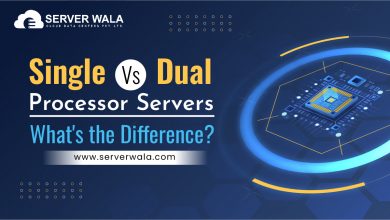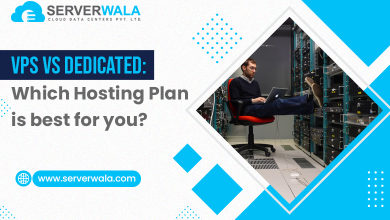How GPU Servers Can Benefit Your Business?

Introduction
In today’s rapidly advancing technological landscape, businesses are increasingly relying on high-performance computing solutions to meet their growing computational needs. Graphics Processing Units (GPU Dedicated Server) have emerged as a game-changer in this domain, offering immense processing power and parallel computing capabilities. GPU servers have become a go-to solution for businesses that require robust computational resources for tasks ranging from 3D modeling and video streaming to artificial intelligence and gaming.
This blog post aims to explore the GPU benefits and shed light on the various applications where they can significantly benefit businesses. By understanding the potential of GPU servers, you can make informed decisions about incorporating them into your infrastructure and harnessing their power to drive your business forward.
What is a GPU Dedicated Server?

A GPU server is a specialized server designed to harness the power of Graphics Processing Units (GPUs) for highly demanding computational tasks. GPUs are particularly optimized for parallel processing which makes them the best pick for workloads that require massive calculations performed simultaneously.
A GPU server is equipped with one or more high-performance GPUs, each containing hundreds or even thousands of cores. These cores work in parallel to process data and execute computations, resulting in significant speedups compared to traditional CPU-based servers. The highly parallel nature of GPUs allows them to excel in tasks such as rendering complex 3D graphics, training machine learning models, simulating physical phenomena, and performing intensive data analysis.
To fully leverage the potential of GPUs, GPU servers are built with additional components that complement its computational capabilities. These servers typically feature powerful processors, such as multi-core CPUs, to handle non-GPU tasks and manage overall system operations. Additionally, GPU servers have abundant memory capacity, often including high-speed RAM, to support the massive data transfers required by the GPUs.
Also Read: Single vs Dual Processor Servers: What’s the Difference?
Fast storage options, such as solid-state drives (SSDs), are commonly integrated into GPU servers to ensure quick access to data, reducing latency and bottlenecks during computations. The combination of GPUs, powerful processors, ample memory, and fast storage creates a robust infrastructure capable of delivering exceptional performance and handling resource-intensive workloads.
GPU servers are designed to facilitate easy integration into existing data centers or cloud computing environments. They are typically housed in specialized server racks and come with advanced cooling systems to dissipate the substantial heat generated by the GPUs during intensive operations. This ensures that the GPUs can operate reliably under heavy computational loads.
Moreover, GPU servers often feature high-speed interconnects, such as PCIe (Peripheral Component Interconnect Express) or NVLink, to facilitate fast data transfers between the GPUs and other components within the server. These interconnects enable efficient communication and data exchange, maximizing the utilization of the GPUs and optimizing overall system performance.
What Are Dedicated GPU Servers Used For?

1. GPU Servers for 3D modeling
GPU servers have revolutionized the field of 3D modeling by significantly reducing rendering times and enhancing visual quality. GPUs excel at rendering realistic graphics and handling complex calculations involved in modeling, texturing, and lighting. With GPU servers, businesses involved in industries such as architecture, film production, and product design can experience faster rendering speeds and improved workflow efficiency.
2. Video Streaming applications
Streaming platforms and content delivery networks (CDNs) often face the challenge of delivering high-quality video content to a massive audience in real-time. GPU servers play a crucial role in video transcoding, enabling efficient encoding and decoding of video streams. By offloading the video processing tasks to GPUs, businesses can achieve better video quality, reduced latency, and improved overall streaming performance.
3. GPU VPS for Rendering
Rendering large-scale projects, such as CGI movies or complex visual effects, can be extremely resource-intensive. GPU Virtual Private Servers (VPS) offer businesses the flexibility to scale their rendering capabilities on-demand. By leveraging GPU VPS, companies can complete rendering tasks faster and handle multiple projects simultaneously, resulting in shorter production cycles and increased productivity.
4. Virtual Desktop Infrastructure with GPU
Virtual Desktop Infrastructure (VDI) enables businesses to provide their employees with remote access to virtual desktop environments. Adding GPUs to VDI environments enhances the performance of graphics-intensive applications, such as computer-aided design (CAD), video editing, and data visualization. GPU-powered VDI ensures a seamless user experience, enabling employees to work efficiently from any location.
5. Resource-intensive tasks (AI)
AI and ML models often require immense computational power to process and analyze vast amounts of data. GPU servers excel at training and running AI/ML algorithms, thanks to their parallel processing capabilities. Businesses leveraging GPU servers for AI applications can accelerate model training times, achieve faster insights, and improve the accuracy of predictions.
6. GPU Dedicated Servers for Gaming
The gaming industry thrives on delivering immersive, high-quality experiences to players. GPU dedicated servers provide the necessary horsepower to host multiplayer games, support real-time physics simulations, and render visually stunning graphics. By utilizing GPU servers, game developers and publishers can ensure smooth gameplay, reduced latency, and visually impressive gaming environments, enhancing player satisfaction.
7. Data Analysis
Data analysis often involves complex calculations and visualization tasks. GPU servers can significantly speed up data processing, allowing businesses to gain insights more quickly. Whether it’s analyzing large datasets, running simulations, or visualizing data in real-time, GPU servers empower businesses to perform data analysis tasks efficiently, leading to more informed decision-making.
What are the Advantages of Dedicated Server GPU?

Here are some incredible benefits of GPU that you must know –
Enhanced Performance
One of the key advantages of GPU-dedicated servers is their ability to deliver enhanced performance. GPUs are designed specifically for parallel processing, and their massive number of cores allows for simultaneous execution of multiple calculations. This parallelism significantly speeds up computation and enables businesses to handle complex workloads with ease. Whether it’s rendering 3D graphics, training machine learning models, or performing data analysis, GPU servers excel at delivering faster processing times and improved performance compared to traditional CPU-based servers.
Cost Efficiency
While GPU servers may involve a higher initial investment compared to traditional servers, they offer excellent cost efficiency in scenarios that require intense computational tasks. The parallel processing capabilities of GPUs enable them to process a large number of calculations simultaneously, reducing the overall processing time. This efficiency translates into cost savings by minimizing the amount of time and resources required to complete computationally intensive tasks. With GPU servers, businesses can achieve higher throughput, improve productivity, and make the most of their computational resources.
Scalability
GPU dedicated servers are highly scalable, making them ideal for businesses with changing computational demands. Whether you need to handle larger workloads or expand your operations, GPU servers offer the flexibility to scale up your infrastructure. You can add more GPUs or servers to your existing setup, allowing you to accommodate increasing computational requirements. The scalability of GPU servers ensures that your business can adapt to evolving needs without compromising performance or efficiency.
Flexibility
GPU servers offer businesses the flexibility to administer a diverse range of applications and workloads. From graphics-intensive tasks such as 3D modeling and video rendering to artificial intelligence and data analysis, GPU servers can tackle diverse workloads efficiently. The ability to accommodate different requirements makes GPU servers versatile solutions for businesses across various industries. Whether you’re in the entertainment sector, scientific research, or finance, GPU servers provide the necessary computational power and performance to meet your specific needs.
Future-Proofing
Incorporating GPU dedicated servers into your infrastructure ensures that your business is future-proofed. GPUs continue to play a vital role in emerging fields such as artificial intelligence, machine learning, and virtual reality. These technologies heavily rely on the computational power and parallel processing capabilities of GPUs. By investing in GPU servers, businesses can stay ahead of the curve and leverage cutting-edge technologies as they evolve. Future-proofing your infrastructure with GPU servers ensures that you have the necessary computational resources to take full advantage of emerging trends and advancements in the tech industry.
Also Read: Guide to Dedicated Server: Types and Use Cases for 2024
Conclusion
GPU servers have revolutionized the way businesses approach computationally demanding tasks. With their immense processing power, parallel computing capabilities, and versatility, GPU servers provide businesses with the tools to tackle complex workloads efficiently. From 3D modeling and video streaming to AI applications and gaming, GPU servers offer significant advantages, including enhanced performance, cost efficiency, scalability, flexibility, and future-proofing.
By harnessing the power of the best GPU Dedicated Server, businesses can gain a competitive edge, improve productivity, and deliver superior experiences to their customers. As technology continues to advance, GPU servers will play an increasingly vital role in helping businesses thrive in the fast-paced, data-driven world of today and tomorrow. Serverwala is now offering GPU Dedicated Servers in 4 locations across the globe. Further, we offer multiple plans with the latest-gen processors and superfast NVIDIA Tesla data center GPU.





